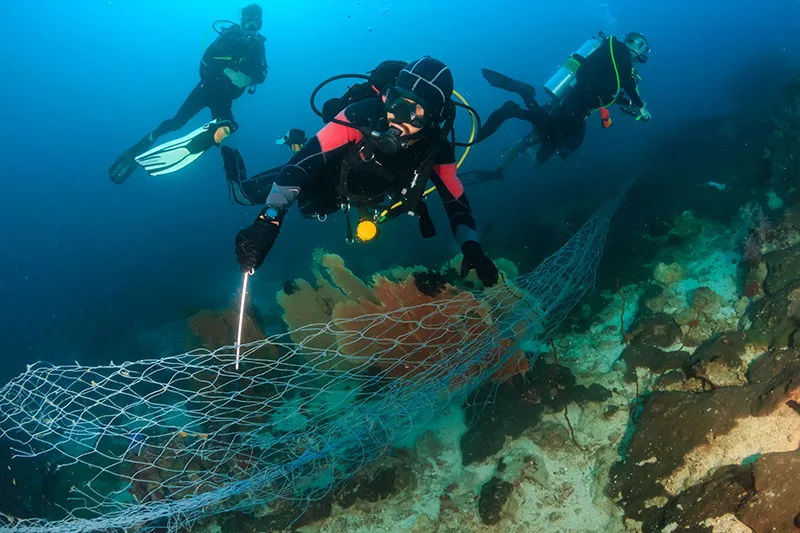The Issue
There is a consistent increase in plastic trash and debris in the oceans
This has far-reaching negative impacts on marine ecosystems. Marine life and seabirds face dire consequences as plastic waste accumulates in ocean currents and drifts along our coastlines. Mammals, fish, and birds often mistake plastic fragments for food, leading to ingestion and subsequent entanglement. The ingestion of plastics introduces toxins into the marine food chain, affecting the health of individual species and posing risks to human populations that rely on or eat seafood.
This debris also contributes to habitat degradation and alters the ocean’s physical and chemical properties, exacerbating the broader challenges of climate change and ocean health. Addressing the issue of ocean debris is a top concern for safeguarding marine biodiversity, ecosystems, and the well-being of aquatic life and human communities.
Amongst the debris, lost fishing gear or ‘ghost gear’ is among the greatest killers in our oceans. Fishing lines, nets, crab and shrimp pots, and other commercial and recreational fishing equipment that have been lost, abandoned, or discarded into the marine environment continue to trap and kill fish, crustaceans, marine mammals, sea turtles, and even seabirds, some of which are endangered species. This ghost gear can also cause damage to underwater habitats and coral reefs, not to mention damage to ships and other marine vessels. Literally, tons of non-biodegradable nets and lines get lost yearly and can continue to “ghost” fish for decades, possibly centuries.
Help Us, Help Them
Every day our network helps make the world’s oceans. seas, and rivers a cleaner place. Your donation helps pay for the pollution removal.

Quick Numbers
- It’s estimated that 640,000 tons of abandoned nets are spread across the world’s oceans (Food and Agriculture Organization and the UNEP)
- These nets comprise up to 10 percent of oceanic litter.
- In Puget Sound alone, derelict fishing gear kills over half a million sea creatures each year (estimated by Northwest Straits Marine Conservation Initiative).
- Plastics can remain in the marine environment for 600 years, with further damage done by animals eating the plastics and chemicals leaching into the water as they break down.
OUR MISSION
Sustainable Seas Initiative (SSI) is a stand-alone charitable organization launched in early 2024 out of an initial project by the EnerGeo Alliance to advance safe, secure, and clean oceans by facilitating improved reporting of collective efforts to improve our marine environment. By collaborating with existing organizations like geoscience operations, maritime operations, port operators, and sportfishing outlets that encounter debris in the oceans, SSI and its members will be uniquely positioned by the one-of-a-kind industry effort to help be global leaders in the removal, disposal, and reporting of marine debris.